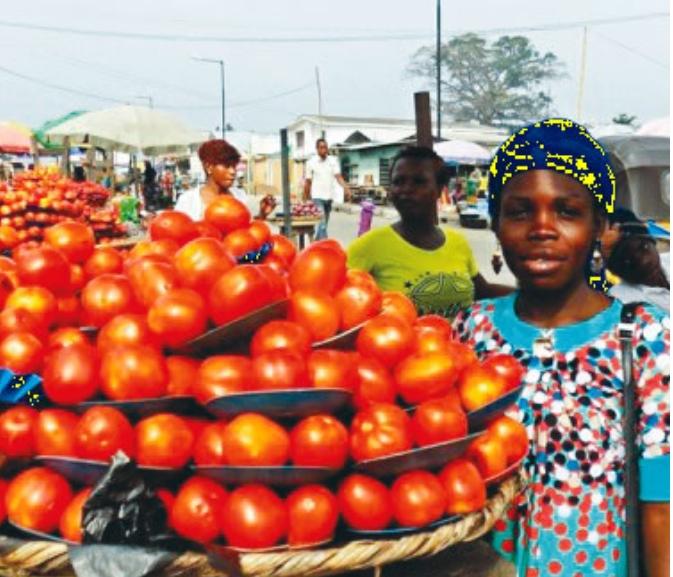Headline
High Food Prices Loom, USAID Warns Nigeria, Others
Published
10 months agoon
By
Editor
The United States Agency for International Development has warned Nigeria and other African countries to brace up for higher food prices, following recent developments that have temporarily halted Ukraine’s food exports to African countries.
USAID’s Deputy Administrator for Policy and Programming, Isobel Coleman, said this on Thursday at a virtual press conference.
According to her, Russia’s decision to withdraw from the Black Sea Grain Initiative had already begun to trigger higher food prices around the world.
She noted the impact of this food price hike would be more felt in developing countries that were import-dependent, and had conventionally relied on grain imports from Ukraine.
READ ALSO: Delta NSCDC Arrests Three For Concealing Diesel In Nylon Bags
Coleman said, “One of the world’s largest breadbaskets is Ukraine. By doing this, Russia is increasing food prices globally. We’ve already seen how global food prices came down over time after the Black Sea Grain Initiative came into place. Since Russia has pulled out of the agreement, food prices have again been on the rise.
“This affects every country around the world, but it affects, most acutely, large import-dependent developing countries that have to spend much of their precious foreign exchange resources to purchase food to feed their population.”
The Black Sea Grain Initiative was conceived to specifically allow for commercial food and fertiliser (including ammonia) exports from three key Ukrainian ports in the Black Sea, which are Odessa, Chornomorsk,
The Russian invasion of Ukraine in February 2022, led to a complete halt of maritime grain shipments from Ukraine, previously a major exporter via the Black Sea. Additionally, Russia temporarily halted its grain exports, further exacerbating the situation.
READ ALSO: Anxiety, Fear As Suspected Herders Taker Over Edo Community Farm Roads, Abduct Five
This resulted in a rise in world food prices and the threat of famine in lower-income countries such as Nigeria, and accusation that Russia was weaponising food supplies.
To address the issue, discussions began in April 2022, hosted by Turkey (which controls the maritime routes from the Black Sea) and supported by the UN. The resulting agreement was signed in Istanbul in July 22, valid for a period of 120 days.
With ratification of the initiative, food prices which had increased significantly, began to decrease. However, on July 17, 2023, the deal expired, and Russia refused to renew it on the ground that global sanctions were blocking its agricultural exports.
According to Coleman, Russia’s withdrawal from the initiative, which in principle, prevented Ukraine from exporting grain to Nigeria and other developing countries, would have dire consequences of food security in these countries.
Through the initiative, she said, Ukraine was able to export 33 million metric tonnes of food, 65 per cent of which went to developing countries, while 20 per cent went to the least developed countries.
READ ALSO: Court Orders Firm, KYC Interproject Ltd Sealed Over Alleged N200m Fraud
According to a report by United Nations Comtrade, Nigeria imported about $500m worth of grain from Ukraine in 2021; showing the termination of the Black Sea Grain Initiative inevitably spelt higher food prices.
Russia, on its part, had promised to fill the space arising from Ukraine’s inability to export its grain, but USAID remained adamant that the Kremlin, which was trying to capitalise on a crisis it had engineered, was not equipped to fill this void, nor should it be allowed to.
Speaking further, Coleman said, USAID was already making plans to explore alternative means through which Ukraine could export its grain without the current hindrances surrounding the conventional maritime route (Black Sea).
She also noted that in the wake of the last food crisis which rocked global food security, the US government had made substantial investments via its ‘Feed The Future’ campaign, to make developing countries more resilient to food crises.
She added, “We have invested in more than 40 countries across Africa, Asia, Latin America and the Carribean. We have 20 target countries that have high levels of poverty and hunger and also a strong potential to drive economic growth and transform food systems.”
The Assistant Administrator in the Bureau for Europe and Eurasia, Elizabeth McKee, who also spoke, described the situation as dire, especially in light of Russia’s announcement that henceforth, any ship heading towards Ukrainian ports would be viewed as military targets.
According to her, in the last nine days, 26 port facilities and infrastructure had been hit by the Russians, while five civilian vessels had been targetted, and 180,000 tonnes of precious grain crops destroyed.
You may like
Headline
B-I-Z-A-R-R-E! Man Missing For 26 Years Found Alive In Neighbour’s House
Published
16 hours agoon
May 17, 2024By
Editor
An Algerian man, Omar Bin Omran, who went missing at the age of 17, 26 years ago following an alleged kidnapping, has been found alive in his neighbour’s house.
According to Daily Mail on Wednesday, Omar was discovered in a hole in the ground within a sheep pen, concealed under stacks of hay.
Omar, one of nine children, disappeared in the city of Djelfa, Algeria, 26 years ago. His family believed he had been killed during the civil war that ravaged the nation in the 1990s and early 2000s.
According to reports, Omar was found less than 200 meters from his family’s home. A 61-year-old neighbour is now in police custody after Omar, now 45, was rescued on May 12.
Footage was shared on social media and broadcast on Algerian television networks of the moment that he was found in what appeared to be a hole in the ground, described by authorities as a sheep pen, within the home of his alleged captor.
READ ALSO: JUST IN: Convicted Kidnap Kingpin Evans Re-arraigned, Opts For Plea Bargain
The blurry video shows torchlights shining into a pit surrounded by hay as Omar furtively looks up, seemingly in shock at the search party surrounding him, with stray pieces of straw in his hair.
Other images have since been circulated of the bearded man emerging from the hole, thought to be a sheep pen, and of him as a teenager, sitting with a dog and with young children before he disappeared.
According to the Algerian newspaper El Khabar, his dog recognized his scent and stayed near where Omar was held. It was alleged that the captor poisoned the dog to ward the family off.
Omar went missing in 1998 while heading to a vocational school. He was found after the captor’s brother aired grievances on social media, reportedly over an inheritance dispute.
This led Omar’s family to search the neighbour’s house, where they found him. The captor attempted to flee but was restrained and arrested.
Tragically, Omar’s mother died in 2013 without knowing the fate of her son. Reports suggest Omar was informed of his mother’s death while in captivity.
A relative said on Facebook: ‘Thank god my cousin was found. Bin Imran Omar is in good health after 26 years of disappearance. Awaiting details of the case and investigations.’
Public prosecutors in Djelfa, a mountain city of around 500,000 people around 140 miles south of coastal capital Algiers, say Omar will receive psychological care after being rescued as they vowed to get him justice.
‘The Djelfa Attorney General’s Office informs the public that on May 12 at 8 pm local time, it found victim Omar B, aged 45, in the case of his neighbour, B.A., aged 61,’ they said in a statement.
A court official in Djelfa was quoted as saying: “Two days ago, on 12 May 2024, the Public Prosecutor’s Office received, through the regional department of the National Gendarmerie in El Jadid, a complaint against an anonymous person claiming that the complainant’s brother, Omar bin Omran, who has been missing for about 30 years, is in the house of one of his neighbours, inside a sheepfold.”
Following this report, the General Prosecutor of the Court of Idrisiya in the province of Djelfa ordered the National Gendarmerie to open an in-depth investigation and officers went to the house in question.
READ ALSO: [FULL LIST] BET Awards 2024: Burna Boy, Asake, Others Bag Nominations As Drake, Nicki Minaj Lead
He added: “The Public Prosecutor’s Office ordered that the victim receive medical and psychological treatment, and the suspect will be presented to the Public Prosecutor’s Office immediately after the completion of the investigation.”
Officials have promised the ‘perpetrator of this heinous crime’ will be tried with ‘severity.’
The suspect, a civil servant, lived alone but was often seen buying enough food for two people. A neighbour recounted to Algerian TV station Bilad that Omar’s mother died without knowing her son was so close by.
Questions have arisen about why Omar did not call for help during his captivity. Some reports claim Omar said he was unable to call out because of a spell cast by his captor, while others suggest his psychological state may have prevented him from seeking help.
The case may be among the world’s longest-running kidnapping cases. Eleven-year-old Jaycee Dugard was kidnapped in Meyers, California in 1991 and remained missing for over 18 years after she was captured by Phillip and Nancy Garrido.
Dugard was kept in depraved conditions and was subjected to extreme sexual abuse, having two children by Phillip Garrido, and later said she adapted to sympathising with her captors to survive.

The Federation Allocation Allocation Committee has disclosed that during the May 2024 meeting of the FAAC held in Abuja, N1.2tn from the April 2024 Federation Account Revenue was shared by the federal, states, and local governments.
The Director of Press and Public Relations, Office of the Accountant-General of the Federation, Mr Bawa Mokwa, disclosed this in a statement on Thursday.
The document revealed that N1.2tn total distributable revenue comprised distributable statutory revenue of N284.71bn, distributable Value Added Tax revenue of N466.45bn, Electronic Money Transfer Levy revenue of N18.02bn, and Exchange Difference Revenue of N438.88bn.
Total revenue of N2.19tn was available in April 2024.
READ ALSO: FAAC: FG, States, LGs Share N1.15trn For January
The total deduction for the cost of collection was N80.51bn; the total transfers, interventions, and refunds were N903.47bn.
Gross statutory revenue of N1.23tn was received for April 2024.
This was higher than the sum of N1.01bn received in March 2024 by N216.28bn.
The gross revenue available from the value-added tax in April 2024 was N500.92bn. This was lower than the N549.69bn available in March 2024 by N48.77bn.
READ ALSO: FAAC Shares N786bn To FG, States, LGs
From the N1.2tn in total distributable revenue, the Federal Government received a total sum of N390.41bn, the state governments received N403.40bn, and the local government councils received N293.81bn.
A total sum of N120.450bn (13 per cent of mineral revenue) was shared with the benefiting states as derivation revenue.
On the N284.716bn distributable statutory revenue, the communiqué stated that the Federal Government received N112.14bn, the state governments received N56.88bn, and the local governments received N43.855bn. The sum of N71.83bn (13 per cent of mineral revenue) was shared with the benefiting states as derivation revenue.
The Federal Government received N69.96bn, the state governments received N233.22bn, and the local governments received N163.26bn from the N466.45bn distributable value-added tax revenue.
READ ALSO: FAAC Shares N1.100 Trillion To FG , States, LGs
A total sum of N2.704bn was received by the FG from the N18.024bn Electronic Money Transfer Levy. The state governments received N9.012bn, and the local governments received N6.30bn.
The Federal Government received N205.59bn from the N438.88bn Exchange Difference revenue. The state governments received N104.27bn, and the local governments received N80.39bn. The sum of N48.62bn (13 per cent of mineral revenue) was shared with the benefiting states as derivation revenue.
According to the communiqué, in April 2024, oil and gas royalties, company income tax, excise duty, petroleum profit tax, electronic money transfer levies, and CET levies increased significantly, while import duty and value-added tax recorded considerable decreases.
The FAAC noted that the balance in the Excess Crude Account remained at $473,754.57.
Headline
Harry & Meghan: Outrage As UK Journalist Says Nigerians Are Nazis
Published
18 hours agoon
May 16, 2024By
Editor
A British journalist, Christopher Wilson, sparked outrage among many Nigerians with a now-deleted tweet.
In the tweet, Wilson compared Nigerians to Nazis for welcoming the Duke and Duchess of Sussex, Prince Harry and Meghan Markle, to Nigeria, igniting widespread condemnation.
The three-day visit of Prince Harry and Meghan to Nigeria attracted significant attention and reactions worldwide.
“Desperate to show his wife they were still ‘royal’ in the eyes of the world, the Duke of Windsor took Wallis on a tour of Germany in 1937. Nigeria’s human rights record is not far short of Nazi Germany’s,” Wilson posted on Tuesday.
Wilson, author of ‘A Greater Love: Charles and Camilla,’ was referring to Wallis Simpson, an American socialite who became the wife of King Edward VIII.
READ ALSO: Step-by-step Guide To Accessing FG Consumer Credit Scheme
Edward VIII, Queen Elizabeth II’s uncle, abdicated the throne in 1936 to marry Simpson.
The monarch’s decision to marry Simpson, a divorcée, triggered a constitutional crisis, leading to Edward’s abdication from the throne in December 1936.
After their marriage, they became known as the Duke and Duchess of Windsor.
The couple travelled extensively, and notably, they visited Adolf Hitler at his Berghof retreat in Bavaria, Nazi Germany, in October 1937.
Markle, an American divorcee, married Prince Harry in 2018.
However, the couple announced their decision to step back from their royal duties in 2020 and relocated to California, United States. Despite their move, they retained their titles as the Duke and Duchess of Sussex.
READ ALSO: Nigerian Burnt To Death In Bangkok Car Crash
When confronted for comparing Nigeria to Nazi Germany, Wilson referenced a 2023 report from the United States Department of State Bureau of Democracy, Human Rights and Labour.
The report he cited highlights human rights abuses in Nigeria, including extrajudicial killings, torture, harsh prison conditions and arbitrary arrests, among others.
The post sparked criticism and backlash from Nigerians and netizens.
On X.com, @wukster2, who tweets anonymously, wrote, “How did we become Nazis @TheWislon? You are so triggered by Harry and Meghan that you have resorted to comparing Nigeria to Nazi Germany. Meghan Markle’s power over mediocre white men and women needs to be studied. We need a global conference.”
A tweep, Faith Harvest, who identifies as @harvest_fa77000 on X, wrote, “Desperate? Nah, there is no comparison. Try as they may to liken Meghan to Wallis Simpson, Meghan is no Wallis and Harry is certainly not an abdicated king with sympathies to Hitler, and as far as human rights records, Christopher Wilson needs to read up on his own history!”
On Arise TV’s The Morning Show, journalist, Rufai Oseni, also voiced his criticism.
READ ALSO: How Australian Doctor Treated Own Brain Cancer With Personal Research Studies
“These people are racist. This is the height of racism. He’s just so jealous because Harry and Megan came to Nigeria and they got relevance and it’s in your face it’s going to hurt you to the very end. I hope that this racism eats your bile up and it continues to eat you because we can’t continue this way. How would you relate them to what happened in Nazi Germany?
“The scenarios are different very different. These people came for a worthy cause in Nigeria which is the Invictus game, to be able to support veterans. Harry has built a brand with this Invictus game that goes around the world and has supported a lot of veterans and that’s something worth celebrating but because of the hatred and the bile that you have against this guy just let him be,” Oseni said.
Glow Lee, who tweets as @GlowanneLee, said, “Christopher Wilson is a royalist journalist critical of Meghan from the beginning and has just compared Nigeria to Nazi Germany. This is the mentality of the hard-core royalist. If they can say these things on Twitter, what would they say off it?”
The Duke and Duchess of Sussex arrived in the capital city of Abuja last Friday and were pictured at a range of engagements over the weekend.
The official purpose of the trip was to celebrate the Invictus Games, Harry’s tournament for wounded soldiers in Nigeria.

Tears, As Jnr. Pope Is Laid To Rest In Enugu

Spiderman: Reactions As Portable Releases New Track Following Arrest [Listen To Audio]

BREAKING: Court Convicts Cosmetic Surgeon Over Client’s Death
Trending

 Headline4 days ago
Headline4 days agoLady Arrested For Allegedly Harassing, Cyberstalking Crown Prince Of Benin Kingdom [VIDEO]

 Headline3 days ago
Headline3 days ago32-year-old Nigerian Doctor Killed In US, Father Mourns

 News4 days ago
News4 days agoEdo Govt Takes Custody Of 4-year-old Girl Used For Adult Content

 Entertainment3 days ago
Entertainment3 days agoVIDEO: Drama As Portable Jumps Gate To Evade Police Arrest

 News3 days ago
News3 days agoMan Arrested For Invading Plateau Bank With Bomb

 News4 days ago
News4 days agoBREAKING: Organised Labour Shut BEDC Head Office

 News3 days ago
News3 days agoSee Lagos Environment Commissioner’s Funny Reply To Resident’s Complaint About Neighbours Moaning Loudly At Night

 Politics4 days ago
Politics4 days agoDefection: Edo Govt, Ex-PDP BoT Member, Idahosa In Verbal War

 Headline4 days ago
Headline4 days ago‘You’re Guilty’ – Judge Roars, Jailed UK-based Nigerian Pastor, Wife 34 Years For Raping, Assaulting Members

 News4 days ago
News4 days agoVIDEO: Lady Laments As Lagos Issues Demolition Notice Two Months After Property Purchase

























